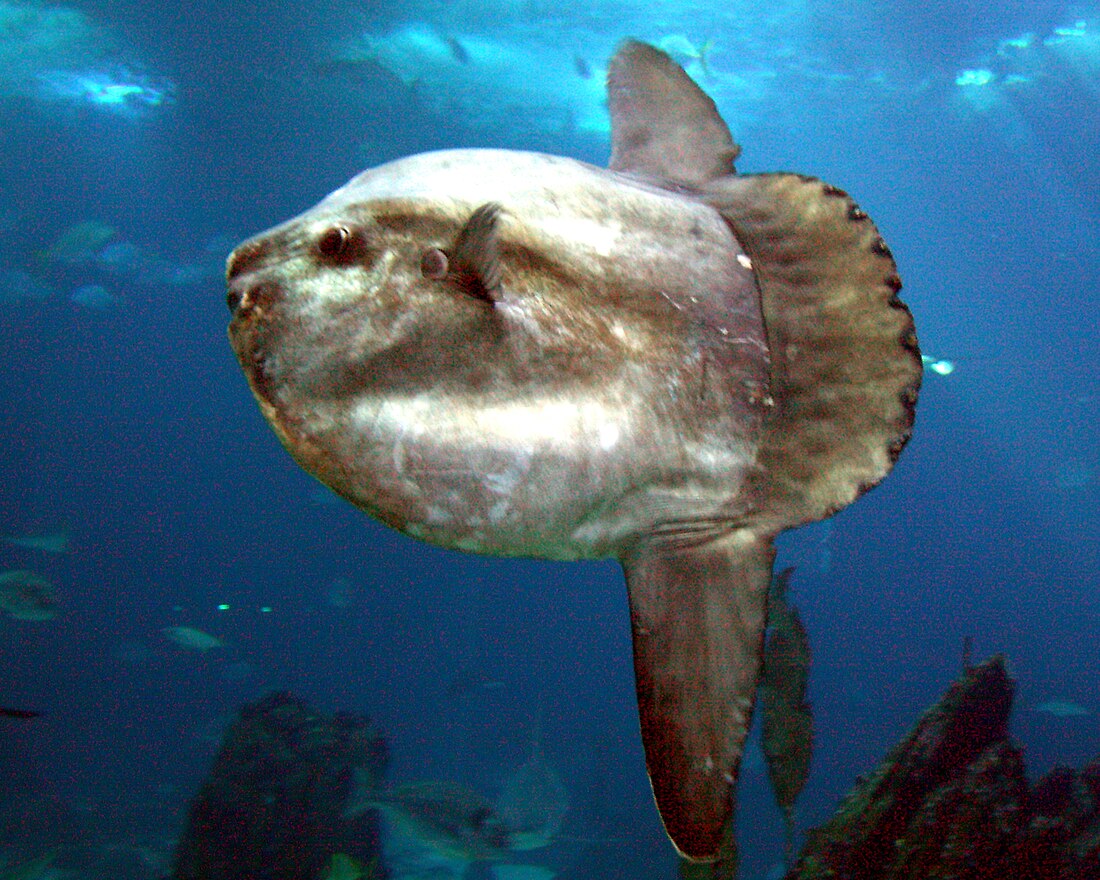Top Qs
Timeline
Chat
Perspective
Mola (fish)
Genus of fishes From Wikipedia, the free encyclopedia
Remove ads
A mola or sunfish, is any fish in the genus Mola (family Molidae). They include the heaviest of all bony fishes.
Remove ads
Description
Summarize
Perspective
Molas develop their truncated, bullet-like shape because the back fin, which is present at birth, never grows. Instead, it folds into itself as the creature matures, creating a rounded rudder called a clavus.[3] Mola in Latin means "millstone" and describes the ocean sunfish's somewhat circular shape.[4][5] They are a silvery colour and have a rough skin texture.[6]
The mola is the heaviest of all the bony fishes: large specimens reach 4.3m (14ft) vertically and 3.0m (10ft) horizontally, and can weigh over 2,700kg (6,000 lb).[7]
Molas inhabit temperate and tropical oceans around the world.[4] They are frequently seen basking in the sun near the surface and are often mistaken for sharks when their huge dorsal fins emerge above the water. Due to their limited thermoregulatory ability and low behavioral responses, sunfish can sometimes overheat while basking at the surface and die as a result.[8] Their teeth are fused into a beak-like structure, and they are unable to fully close their relatively small mouths.[9]
Ocean sunfish can become infested with skin parasites, so they often invite small fish or even birds to feed on them.[10] Sunfish sometimes breach the surface up to 3m (10ft) in the air in an attempt to shake off parasites.[11]
Molas are relatively poor swimmers, waggling their large dorsal and anal fins to move, and steering with their clavus.[12] Their food of choice is jellyfish, though they will eat small fish and large amounts of zooplankton and algae as well.[4] They are harmless to people, but can be very curious and will often approach divers.[13]
Their population is considered vulnerable,[14] as they are frequently snagged in drift gill nets and can suffocate on plastic bags, which resemble jellyfish, their main food source.[15]
They breed by producing around 300 million eggs directly into the ocean, which are externally fertilized by sperm into the water column.[16]
Remove ads
Taxonomy
In 1766, Joseph Kölreuter published a fish name Mola but did not treat it as a Linnaean genus (i.e. not binomial), so the name is invalid under the rules of the ICZN. The first author who used the name Mola as a valid genus was Johann Heinrich Linck the Younger in 1790. Mola is therefore the oldest available name, with Tetraodon mola Linnaeus, 1758 as its type species.[17]
Species
There are currently 3 recognized extant species in this genus:[18][19]
- Mola mola (Linnaeus, 1758) (Ocean sunfish)
- Mola alexandrini (Giglioli, 1883) (Southern sunfish)
- Mola tecta Nyegaard et al., 2017 (Hoodwinker sunfish)
- †Mola pileata (extinct), Upper Miocene to Middle Miocene
References
Wikiwand - on
Seamless Wikipedia browsing. On steroids.
Remove ads

